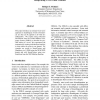158 search results - page 14 / 32 » Word sense disambiguation in information retrieval revisited |
ACL
2008
13 years 8 months ago
2008
We propose a novel method for extracting semantic information about a verb's arguments and apply it to Verb Sense Disambiguation (VSD). We contrast this method with two popul...
AIRS
2006
Springer
13 years 11 months ago
2006
Springer
This paper proposes a word sense language model based method for information retrieval. This method, differing from most of traditional ones, combines word senses defined in a thes...
COLING
2008
13 years 8 months ago
2008
Supervised approaches to Word Sense Disambiguation (WSD) have been shown to outperform other approaches but are hampered by reliance on labeled training examples (the data acquisi...
LREC
2010
13 years 8 months ago
2010
In the paper we investigate the impact of data size on a Word Sense Disambiguation task (WSD). We question the assumption that the knowledge acquisition bottleneck, which is known...
ACL
2008
13 years 8 months ago
2008
This paper introduces an unsupervised vector approach to disambiguate words in biomedical text that can be applied to all-word disambiguation. We explore using contextual informat...

